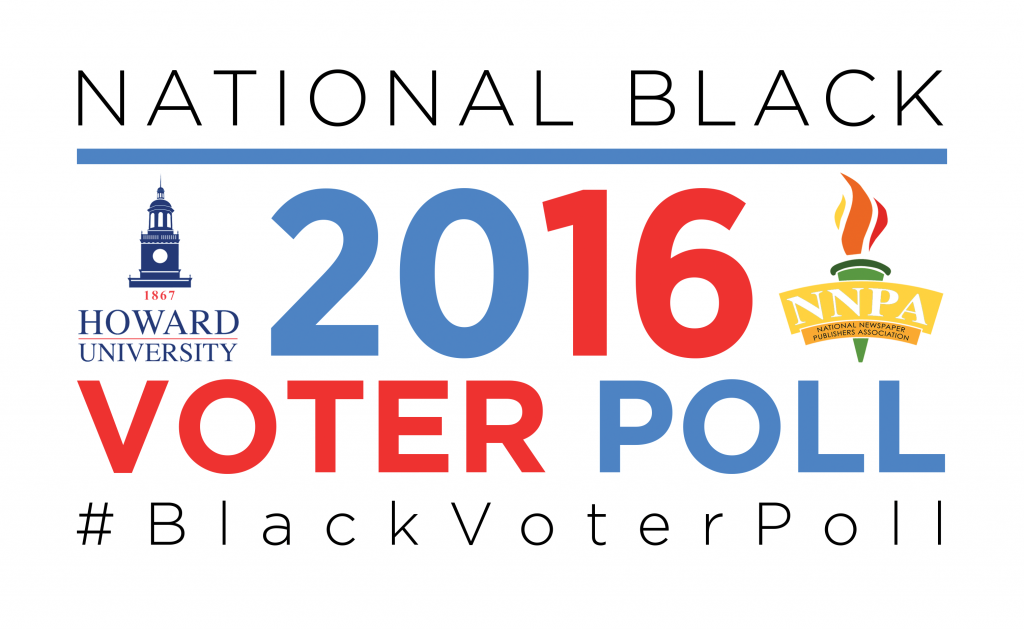(WASHINGTON, DC.) With the election only days away, a new national poll shows that Black American voters overwhelmingly plan to vote for Hillary Clinton as their choice for President of the United States. Their choice is influenced by concerns about high quality, affordable education, income inequality, jobs, the economy, race relations and racial justice.
 The National Black Voter Poll found a high degree of engagement by registered black voters in the election, with 96% of respondents saying they will cast ballots. The same number said their friends also intend to vote. Nearly all respondents in the survey said they voted in both the 2008 and 2012 elections.
The National Black Voter Poll found a high degree of engagement by registered black voters in the election, with 96% of respondents saying they will cast ballots. The same number said their friends also intend to vote. Nearly all respondents in the survey said they voted in both the 2008 and 2012 elections.
Taken together, the data predict a high voter turnout among Black American voters in the November 8, 2016 election and a strong preference for Hillary Clinton over Donald Trump.
A substantial majority (89%) indicated they will vote for Clinton, and two-thirds (67%) said they strongly favor Clinton. Another 23% declared “moderate support” for her. A slightly higher percent (74%) said they have “overall favorable feelings” for Clinton, compared to 2% who said they had favorable feelings for Trump.
When asked “Do you think Donald Trump is a racist?” 84% responded, “Yes.”
In contrast to feelings toward the current election year’s candidates, 90% of respondents said they have “overall favorable feelings” toward President Barak Obama.
Findings are based on a national random sample of more than 900 voters from 22,000 telephone calls made between October 21 and 30, 2016 by researchers in a joint National Newspaper Publishers Association – Howard University poll. This was the first national-level scientific study focused exclusively on voters who identify as African American, Afro-Hispanic or other black identity.
The goal of the research was to develop a profile of Black American voters in a year when race is believed to be a defining factor in the outcome of presidential and congressional races.
The vast majority of respondents in the survey identified as Democrats. To the question “In general, do you think of yourself as Democrat, Republican, or something else?” 82% of respondents said “Democrat” and only 2% said Republican. Another 16% said they are either “Independent” or “Other” (9% and 7%, respectively).
A large majority of respondents (87%) identified high quality education as an influence in their decisions, and a nearly equal percent (84%) pointed to concerns about college affordability as a factor.
Other concerns shaping decisions were the economy and jobs (85%), race relations and racial justice (84%), and income inequality (82%).
When asked about where they obtain their information about political candidates, nearly half (46%) said from local TV news, and another fourth (24%) said from cable stations. Approximately a fifth (18%) said they rely on black newspapers for information about elections.
Revelations of new FBI probes into Hillary Clinton’s emails occurred in the midst of the research, prompting researchers to compare participant responses to candidates before and after this news. They found that favorable feelings toward Clinton rose slightly and those toward Trump were cut in half.
The sample of more than 900 registered black voters was 70% female and 30% male. When considered alongside the 96% who said they voted in the previous two elections and also plan to vote on Nov. 8, black women show they are at the forefront of social change and political history in the United States, by voting to elect the nation’s first black and now its first female president.
A majority of respondents said they had attended college (73%), and were 56 years of age or older. Millennials between the ages of 18-35 accounted for 11% of the sample.
Those surveyed were nearly equally split between employed and not-employed (53% and 47%, respectively). Of those employed, 30% said they were federal employees, and 18% said they were union members. Of those not employed, 78% were retired and 22% were unemployed. Nearly half (48%) of respondents said they are married and most (84%) have a religious affiliation (a strong majority of those Christian).
The research was conducted using social science survey methods at Howard University. Research findings, however, do not necessarily reflect the personal views of the researchers, the faculty or administration of Howard University, or the members of the National Newspaper Publishers Association.
Principal investigators on the interdisciplinary Howard research team included Dr. William Spriggs, Department of Economics; Dr. Terri Adams and Dr. Rubin Patterson, Department of Sociology and Criminology; Dr. Lorenzo Morris, Department of Political Science; and Dr. Carolyn Byerly, Department of Communication, Culture and Media Studies. Principal liaisons from the NNPA included President and CEO Dr. Benjamin Chavis, and Chairman of the Board Denise Rolark Barnes.






